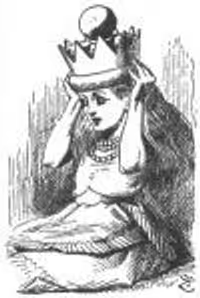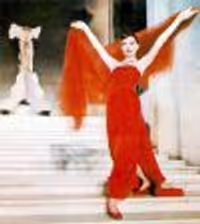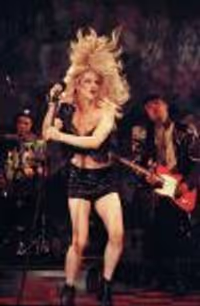Musicals that have aged poorly with time?
#75Musicals that have aged poorly with time?
Posted: 3/28/16 at 1:21pm
In the first place, Hammerstein didn't invent the characters in OKLAHOMA! Lynn Riggs invented them in GREEN GROW THE LILACS, the source adapted for the musical.
In the second, who said villains have to get a chance for redemption? Oddly enough, the great-grandfather of all Western dramaturgy, Aristotle, never mentions anything of the kind.
Third, what Hammerstein DOES do is argue for his villain's point of view. Although "Lonely Room" wasn't used in the film and isn't as well known, it does an excellent job of dramatizing the bleakness of Jud's life and explains why he acts the way he does. "Poor Jud is Dead" does its job in showing how Jud is a target of ridicule by the others in the community. Jus is NOT a melodrama villain, who is evil just for evil's sake.
Fourth, the show was written in the middle of a world war against fascist dictators. How would you expect it to portray a bully? (And if you'll check the news, I think you'll find we're still struggling against fascism, at home and abroad, today.)
Good to see another friendly discussion on this board about a matter of life and death. I have to admit, I haven’t noticed a lot of fascists around lately, although I was pretty pissed when they installed one of those automatic cameras in front of the high school that takes a photo of your license plate if it catches you speeding.
I'm aware of the source for the book of Oklahoma. Oscar Hammerstein II was and is a giant of American arts and letters. Lynn Riggs in comparison is a lilliputian. I'm sure that you understand that Hammerstein had no obligation and I'm sure no inclination to accept the characters as portrayed by Riggs.
Hammerstein did not have to give Jud a chance for redemption, but as a compassionate man who was slow to judge others it was unlike him to just let Jud ratify the shallow and smug opinions that the other characters had of him with his final act of attempting to murder Curly. I'm aware of "Lonely Room." When I was 10 and 11 my mother played the OBC albums all the time. "Lonely Room" was the most disturbing song to my young mind. It does let the audience know that Jud is lonely, unloved, uneducated, suffering from a desperate unrequited love for Laurey and without hope for the future.
But a modern audience already knows this. No one in the cast treats him with any kindness or understanding. Laurey toys with Jud, although she is aware of his love for her, when she agrees to go to the social with him just to get back at Curley, and then changes her mind and dumps him. Curley visits him and tries to manipulate him into killing himself.
For an instance of what I mean by redemption you have to look no further than Carousel, where Billy, unable to be admitted to heaven, returns to New England for one day, the graduation day of the lonely and bitter daughter he never knew, and gives her a star stolen from heaven. He tells Julie that he had really loved her as his daughter shows the first signs of reaching out to others.
I will concede, however, that "Lonely Room" does show Jud as a more complicated person to the audience. From the point of view of any of the characters in his life, though, Jud is the melodramatic villain and Jud does nothing to persuade them otherwise.
I really don't think that Oscar wrote the book as a political allegory in which Jud serves as a stand-in for Hitler or Mussolini. I think that he wrote it hoping for a commercial success, since it had been many years since he had had a hit musical.
Contrast the book here with that of Carousel, South Pacific and The King and I and I think that you would have to admit that the leading characters in those musicals are drawn with much greater depth and the stories are much more intricate.
Anyway, we are not debating Shakespeare here, just a popular American musical that ultimately lives or dies with its musical score. If we moved this discussion to opera, how would the stories that accompany many of the most famous operas stand up today's social mores? And come to think of it, what about Shakespeare and that Shylock character.
#76Musicals that have aged poorly with time?
Posted: 3/28/16 at 1:25pm
Randomlink1 said: "Scarywarhol said: "Kind of upsetting how frequently addressing a topic is considered celebrating it. Little Shop especially, come on--it's as popular as ever and you are meant to hate Orin for being abusive."
Yeah, I don't understand why people think that makes it age poorly with time or condone it. I mean, they have a song about Orin glorifying how evil he is, to the point where as a child he murdered small animals for fun. It's so cheesy that you can't really take it seriously, and Audrey and his relationship is never supposed to be a representation of a good relationship."
The cut song for Audrey, "The Worse He Treats Me," plays the abuse for laughs. And it's really, really awful. I don't think it ever made it into a public performance, and I believe was treated with disgust by pretty much everyone involved.
#77Musicals that have aged poorly with time?
Posted: 3/28/16 at 1:46pm
Yeah, it was dropped very early when the show was being written. It was a tricky line to find, but clearly Ashman eventually did.
#78Musicals that have aged poorly with time?
Posted: 3/28/16 at 2:21pm
Scarywarhol said: "Yeah, it was dropped very early when the show was being written. It was a tricky line to find, but clearly Ashman eventually did. "
He very much did. The show, despite being a sci-fi comedy, takes Audrey's plight seriously.
#79Musicals that have aged poorly with time?
Posted: 3/28/16 at 2:42pm
Regarding Carousel, I don't think it condones domestic violence at all. Billy's overall violent character is not portrayed as a good thing; he has to fight his way out of eternal damnation, after all.
However, when Kad explained that Little Shop of Horrors doesn't romanticize domestic violence, it occurred to me that Carousel literally does romanticize it. How else to describe the scene where Billy's two victims rapturously downplay his violence? I can't blame any audience member from cringing at this, or any director for being tempted to change it.
Frankly, I've always found the ending of Carousel to be rather unpersuasive anyhow. Billy's apparent redemption seems very much unearned. This is one of my very favorite shows, for the music and the story, but I can't deny that it lets me down a bit at the end.
#80Musicals that have aged poorly with time?
Posted: 3/28/16 at 2:51pm
Here is a clip from the television special HEY MR. PRODUCER which captures a little bit of Joanna Riding's brilliant performance in CAROUSEL doing the scene with Louise at the end of the play. When I saw the show, I remember thinking in this moment where she tells Louise that it is possible for someone to 'hit you and it not hurt at all' that she was weighing the hurt of losing someone pre-maturely with their behavior when they were alive. It was not a naive moment but one of personal struggle and confession. She was wonderful.
https://www.youtube.com/watch?v=-LhnhiW6cqQ
Wilmingtom
Broadway Legend Joined: 7/18/11
#81Musicals that have aged poorly with time?
Posted: 3/28/16 at 2:53pm
I think Hammerstein's intent in Carousel is to show us how love can blind you to realities you don't want to acknowledge. Julie is desperate to believe that she hasn't made a mistake in marrying Billy. Only when he's gone is she able to abandon her delusions. And as for AGYG, keep in mind that Sitting Bull is always the smartest guy in the room.
#82Musicals that have aged poorly with time?
Posted: 3/28/16 at 3:01pm
kdogg36 said: "Regarding Carousel, I don't think it condones domestic violence at all. Billy's overall violent character is not portrayed as a good thing; he has to fight his way out of eternal damnation, after all.
However, when Kad explained that Little Shop of Horrors doesn't romanticize domestic violence, it occurred to me that Carousel literally does romanticize it. How else to describe a scene where Billy's two victims compare his violence to a kiss? I can't blame any audience member from cringing at this, or any director for being tempted to change it.
Frankly, I've always found the ending of Carousel to be rather unpersuasive anyhow. Billy's apparent redemption seems very much unearned. This is one of my very favorite shows, for the music and the story, but I can't deny that it lets me down a bit at the end.
"
People need to stop misremembering that scene. Louise alone, in the original script, describes it as not hurting: almost as if "he kissed my hand" (he slaps her hand in the original script). And by describing it that way, she's not saying it was painless because it was a man, she's saying it was *literally* painless because, well, he's a friggin' ghost. It's Hammerstein trying to be a little poetic about stating the obvious. It's not my favorite line (Hytner cut it in the revival), but it's meaning has nothing to do with romance. Julie never describes it as "a kiss" once, not in that scene or ever in the whole show. The only time she talks about the violence is with Carrie in Act 1 and it's pretty brutal to listen to because you have Carrie giving her common sense to leave Billy and yet Julie won't listen.
When people hear Julie say "It is possible, dear, for someone to hit you, hit you hard, and have it not hurt at all" they misinterpret this, as well, as the message of the show. It's not. It shows Billy just the amount of damage he caused to the only person he ever loved (in the Hytner revival, they added an impulsive "No!" for Billy when he hears Julie say this). It's seeing Julie like that (nearly a shell of a human) that gives Billy the final push to ACTUALLY do right by his wife and child. And because time is running out, he can't do any grand gestures to make their lives better. All he can do is instill in them the hope and courage to continue on and enjoy the rest of their lives, which he does.
#83Musicals that have aged poorly with time?
Posted: 3/28/16 at 3:05pm
Thanks for the correction on this. I've edited my previous post slightly for accuracy. I hope that's not cheating. :)
#84Musicals that have aged poorly with time?
Posted: 3/28/16 at 3:06pm
Wilmingtom said: " And as for AGYG, keep in mind that Sitting Bull is always the smartest guy in the room."
While Sitting Bull is given a good treatment, "I'm An Indian, Too" is dominated by ridiculous fake Indian names.
I have more issues with the end of Annie Get Your Gun, which essentially says, "Don't be better than a man."
#85Musicals that have aged poorly with time?
Posted: 3/28/16 at 4:18pm
The books may date but many of the songs are timeless, which really is the heart and soul of musicals. Take something like"Hello Dolly" which may seem antiquated but the songs hold up.
VintageSnarker
Broadway Legend Joined: 1/30/15
#86Musicals that have aged poorly with time?
Posted: 3/28/16 at 5:01pm
"There's nothing in Annie Get Your Gun that's offensive to the period in which it takes place. It's only offensive if you're viewing it without the ability to assign it context"
Disagree. Putting aside specific shows (I think no show is owed performances... that is, some shows could largely be retired if they no longer suit popular tastes), I don't know where this idea comes from that everyone was fine with a show when it came out. You only have to look at these boards to see that regardless of general popularity, there will always be dissenters. And yes, in many of these cases it was people who were formerly disenfranchised and without a voice who might have complained.
Randomlink1
Understudy Joined: 3/13/16
#87Musicals that have aged poorly with time?
Posted: 3/28/16 at 5:12pm
Yeah, it doesn't take that much research to discover that Native Americans were pretty pissed off when the show came out. They boycotted the production and the 1950 movie, and most contemporary revivals omit the red face to avoid the boycotts. Annie get your gun started off in a bad state, so I wouldn't say it was that much of a period piece as it was racist to those who were often mocked frequently at the time. Again, like someone else on the message board stated earlier, it's like blackface. We should understand its history and why it was accepted at the time, but we shouldn't excuse people who performed it and say it's ok.
#89Musicals that have aged poorly with time?
Posted: 3/28/16 at 5:37pm
VintageSnarker said: "Disagree. Putting aside specific shows (I think no show is owed performances... that is, some shows could largely be retired if they no longer suit popular tastes), I don't know where this idea comes from that everyone was fine with a show when it came out. You only have to look at these boards to see that regardless of general popularity, there will always be dissenters. And yes, in many of these cases it was people who were formerly disenfranchised and without a voice who might have complained. "
It's something I've seen in all sorts of circles - fires breaking out because someone dared suggest that maybe pinball has an ongoing history of sexism, fights over whether or not Linklater's Boyhood is universal or racially specific in its representation of coming-of-age, etc etc. White, well-to-do men have a tremendous amount of say, and have had it for centuries. When the "new" culture full of people who have, up until now, lacked an outlet for their opinion suddenly have that outlet, the old guard overreacts, gets hostile, defensive, because they've never had to listen to anyone other than themselves.
Dave19
Broadway Legend Joined: 12/23/11
#90Musicals that have aged poorly with time?
Posted: 3/28/16 at 5:57pm
Hamilton already feels dated.
The style is just not timeless enough. Also the way of storytelling (then he did this, then this and that happened and the world said: oh my god, the world is gonna know your name, this kid is insane.", almost laughable.
I don't think people will take it serious for long.
It is not up to the level of Rent, quality wise, because Rent has more musicality and a more intelligent way of storytelling.
The Other One
Broadway Legend Joined: 4/1/08
#91Musicals that have aged poorly with time?
Posted: 3/28/16 at 6:28pm
PThespian said: "What about Grease!?
Bad girl thinks she's pregnant, and the good girl only gets her guy by becoming more of "bad girl."
Seems like that whole notion means something different today than when it was written.
Nonetheless as the ratings for the recent TV version shows it is still a popular show.
Is popularity the measuring stick for whether or not a show has aged well or not?"
It was always intended as a spoof of the 50s, so it doesn't really apply.
#92Musicals that have aged poorly with time?
Posted: 3/28/16 at 6:36pm
bk said: "
Right, because those things never existed and should be ignored as if they never had. To which I say, um, no. I enjoy Carousel as the beautifully written show it is. I enjoy Annie Get Your Gun as the funny and charming show it is - I don't need them rewritten because I have a brain and can understand when they were written and when they take place. But let's just burn all copies of Gone with the Wind and Birth of a Nation and Showboat and anything written in a time that wasn't this little insular politically correct world we inhabit now. No thanks, but I'm happy that you're happy in that world. I prefer a world in which there is history and if I see something on stage that makes me uncomfortable because it's of a different time, then GOOD - I learn something or I say, "Wow, isn't it nice that things have changed." What I don't do is act as if anything that makes me feel that way should be revised or "reengineered".
"
bk, I agree with your basic point, but I don't think GONE WITH THE WIND and BIRTH OF A NATION are the examples you want. The former is an intentional glossing over the evils of the antebellum South and the latter (while absolutely important as a document of film history) is a propaganda tool promoting the KKK.
SHOW BOAT is a better example for your point.
#93Musicals that have aged poorly with time?
Posted: 3/28/16 at 6:39pm
Patti LuPone FANatic said: "I would say "Little Shop of Horrors" has aged poorly. I'm am somewhat aware of it, but not sure of the time period. There's a song from the show that I hear on Sirius XM every once in a while. These lyrics make me wince: "Seymour's the greatest...but I'm dating a semi sadist." Then she says something about being in a cast and having a black eye. Yuck.
"
As you say, you don't know the show. The dentist's abuse of Audrey is not portrayed as acceptable and--SPOILER ALERT--the dentist gets his comeuppance within the plot of the play.
The show is set in the 1950s, but not so firmly that we can't understand it today.
#94Musicals that have aged poorly with time?
Posted: 3/28/16 at 6:52pm
Charley Kringas Inc said: "It'd be fun to see a campy revival of Applause, though it's too bad about the "I don't need a career, I need a MAN!" ending, which is what really dates it.
"
That and the fact that it treats "turning 40" as s near-death experience for women.
#95Musicals that have aged poorly with time?
Posted: 3/28/16 at 6:52pm
How about TKAI? I can't imagine anyone seeing the horrors of the Vietnam War and (today) the horrors in the Middle East and thinking that the mindset behind TKAI is terribly naive, condescending, and dated to a post-War American excpetionalism zeitgest. But that doesn't mean TKAI isn't without value.
Ultimately I think what dates musicals is the music. If the score doesn't stand the test of time, then no amount of relevance will make it revived. If the score does stand the test of time, then it never becomes dated.
#96Musicals that have aged poorly with time?
Posted: 3/28/16 at 6:54pm
Patash said: "I'd add Little Abner. Why do some high schools and community theatres still do this (other than whoever picks the shows happens to love it, probably because they once played in it)? First of all, no one under the age of about 40 even knows who these characters are.
Shows like Fiorello and Call Me Madam fall flat because the characters are no longer really well known, but shows like Guys and Dolls and Gypsy still play beautifully.
"
LI'L ABNER has been a favorite of amateur theater since I was a kid. The reason is that it has dozens of fun characters and offers everybody in the show something fun to play. But I agree, the politics being satirized are sadly out of date. Too bad, because it is one of the greatest comic scores.
#97Musicals that have aged poorly with time?
Posted: 3/28/16 at 7:11pm
OlBlueEyes said:
"Good to see another friendly discussion on this board about a matter of life and death. I have to admit, I haven’t noticed a lot of fascists around lately, although I was pretty pissed when they installed one of those automatic cameras in front of the high school that takes a photo of your license plate if it catches you speeding.
I'm aware of the source for the book of Oklahoma. Oscar Hammerstein II was and is a giant of American arts and letters. Lynn Riggs in comparison is a lilliputian. I'm sure that you understand that Hammerstein had no obligation and I'm sure no inclination to accept the characters as portrayed by Riggs.
Hammerstein did not have to give Jud a chance for redemption, but as a compassionate man who was slow to judge others it was unlike him to just let Jud ratify the shallow and smug opinions that the other characters had of him with his final act of attempting to murder Curly. I'm aware of "Lonely Room." When I was 10 and 11 my mother played the OBC albums all the time. "Lonely Room" was the most disturbing song to my young mind. It does let the audience know that Jud is lonely, unloved, uneducated, suffering from a desperate unrequited love for Laurey and without hope for the future.
But a modern audience already knows this. No one in the cast treats him with any kindness or understanding. Laurey toys with Jud, although she is aware of his love for her, when she agrees to go to the social with him just to get back at Curley, and then changes her mind and dumps him. Curley visits him and tries to manipulate him into killing himself.
For an instance of what I mean by redemption you have to look no further than Carousel, where Billy, unable to be admitted to heaven, returns to New England for one day, the graduation day of the lonely and bitter daughter he never knew, and gives her a star stolen from heaven. He tells Julie that he had really loved her as his daughter shows the first signs of reaching out to others.
I will concede, however, that "Lonely Room" does show Jud as a more complicated person to the audience. From the point of view of any of the characters in his life, though, Jud is the melodramatic villain and Jud does nothing to persuade them otherwise.
I really don't think that Oscar wrote the book as a political allegory in which Jud serves as a stand-in for Hitler or Mussolini. I think that he wrote it hoping for a commercial success, since it had been many years since he had had a hit musical.
Contrast the book here with that of Carousel, South Pacific and The King and I and I think that you would have to admit that the leading characters in those musicals are drawn with much greater depth and the stories are much more intricate.
Anyway, we are not debating Shakespeare here, just a popular American musical that ultimately lives or dies with its musical score. If we moved this discussion to opera, how would the stories that accompany many of the most famous operas stand up today's social mores? And come to think of it, what about Shakespeare and that Shylock character.
"
If you haven't noticed any fascists lately you haven't been watching the GOP debates. Or Putin in Russia. Or the so-called "Islamic State". (Please note I wrote fascist with a small "f".)
Again, I think you might consider when OKLAHOMA! was written.
Yes, Laurey's toying with Jud is especially unfair, but she toys with Curley as well and, let's face it, she's a young woman in a rural area, not a sophisticated femme fatale.
If you think OKLAHOMA! is not a political allegory, but just an attempt at commercialism, you don't know the period or Oscar Hammerstein. Yes, the show was a monster hit, but, rather famously, nobody expected it to be. Opening with an old woman churning butter was not a recipe for commercial success in 1943.
And Oscar Hammerstein was not only a supporter of our American union, he was prominent in the movement to expand the United Nations to a world federation based on the American system.
In post-Vietnam America, we may find "Brand new state, gonna treat you great!" corny. But to Hammerstein and his audiences (many of the latter being servicemen on their way to war overseas) understood the show quite correctly as an allegory for our myths of the founding of this country.
Now if your point is that show is none too subtle in that Curley = good guy and Jud = bad, I can't argue with that. But isn't that also true of Jigger in CAROUSEL and the Nazis in THE SOUND OF MUSIC?
I don't understand why any of this makes OKLAHOMA! "corny", unless we're all so jaded we no longer appreciate that young people fall in love and sometimes make foolish choices (such as flirting with Jud to make Curly jealous) along the way.
#98Musicals that have aged poorly with time?
Posted: 3/28/16 at 7:32pm
skies said: "The books may date but many of the songs are timeless, which really is the heart and soul of musicals. Take something like"Hello Dolly" which may seem antiquated but the songs hold up."
I don't think Hello Dolly has aged poorly. The theme of the story is very much still present in today's world - a (scheming) who's been a through a lot of pain, and is so generous of heart and wit, that everyone around her just falls to her charm. I do hope they cut "Put On Your Sunday Clothes" from the revival though. It's corny, and irritating.
#99Musicals that have aged poorly with time?
Posted: 3/28/16 at 7:34pm
Also - I just want to say that posts like these make me so so happy that found this board. It's highly educational, opinionated, and comes from a place of actual passion for stage - not something I get in real life because my friends don't care about live theater nearly as much as we do.
Thank you, all of you! :) <3
bk
Broadway Legend Joined: 7/20/03
#100Musicals that have aged poorly with time?
Posted: 3/28/16 at 8:00pm
GavestonPS said: "bk said: "
Right, because those things never existed and should be ignored as if they never had. To which I say, um, no. I enjoy Carousel as the beautifully written show it is. I enjoy Annie Get Your Gun as the funny and charming show it is - I don't need them rewritten because I have a brain and can understand when they were written and when they take place. But let's just burn all copies of Gone with the Wind and Birth of a Nation and Showboat and anything written in a time that wasn't this little insular politically correct world we inhabit now. No thanks, but I'm happy that you're happy in that world. I prefer a world in which there is history and if I see something on stage that makes me uncomfortable because it's of a different time, then GOOD - I learn something or I say, "Wow, isn't it nice that things have changed." What I don't do is act as if anything that makes me feel that way should be revised or "reengineered".
"
bk, I agree with your basic point, but I don't think GONE WITH THE WIND and BIRTH OF A NATION are the examples you want. The former is an intentional glossing over the evils of the antebellum South and the latter (while absolutely important as a document of film history) is a propaganda tool promoting the KKK.
SHOW BOAT is a better example for your point.
"
I understand what Gone With the Wind and Birth of a Nation are - shall we ban them? Act as if they never existed?
Videos










